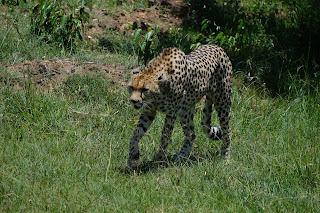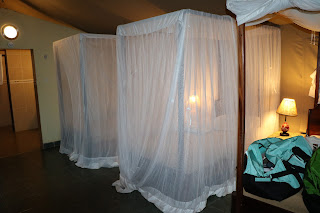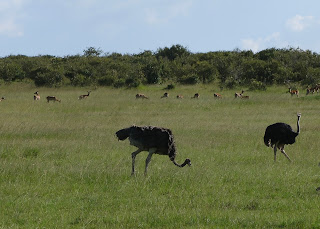Another long day of driving to reach Maasai Mara. Seems like a lot, but is necessary to get to desired locations... Our game drives are in National Parks or Preserves. We see a few animals outside of the parks, but not many.
The porters are waiting outside when we go to put bags out at 6:15. 6:30 breakfast and then we are on the road.
Our driver, Gordon, explains all of the stickers needed on the vehicle. Kenya inspection, speed governor, insurance, tours license... many taxes, he says. Because he is employed by a legitimate company, he has to pay income tax, he shares. The day workers, of whom there are many in farming and construction, work when they can get it on a cash basis and pay no taxes.Adam, the tour director, is riding with us today and he talks a lot. Being from Tanzania, some of Adam's information is about that country which gained independence in 1963. He sometimes calls it Tanganika, which is what it was before joining with Zanzibar in 1963. Tanganika had 59 million people and Zanzibar 2 million. The current president, a woman who is a 3rd wife, is muslim and from Zanzibar. The former president, he says, died from COVID (with some help!) and was big on eliminating corruption. Corruption is rampant in both Kenya and Tanzania. Kenya, he says is the most progressive country in East Africa and has some women in prominent positions.
We are surprised at the number of cacti here. Some, I think they are called candelabra, grow in hedges. We are traveling in the Rift Valley again, which runs from the Dead Sea to Madagascar. The acacia trees, sometimes called umbrella trees, are everywhere.Many people are wearing colorful blankets/clothes. Red is especially popular, particularly with the Maasai tribes who associate it with bravery and believe it helps to protect them from wild animals. The Maasai are tall, thin people who are somewhat nomadic and keep cattle, sheep and/or goats. Adam says their animals are like their ATM - they trade them as needed to buy supplies. They eat milk from the animals and also drink their blood, bleeding animals on a rotating basis. They do not eat wild animals.
There are 40 or more tribes in Kenya and each has its own culture and language. The tribes are divided into clans and you can not marry someone in the same clan. Nairobi was a melting pot of different tribes, while the rural areas are more segregated geographically. Tribe seems a very important part of their identity.
We enter Maasai Mara and almost immediately come upon a cheetah with a fresh kill. It left the kill when we arrived, but soon ventures out and pulls the impala into the brush. Beautiful animal!!
get some help with a finicky safe and relax a bit till our 3:30 meeting for a game drive. Everywhere we stayed had room safes. The pathway to the tents is somewhat lit, but they still provide escorts to and from the main dining area when it is dark. Tipping is not required, but is so appreciated that we don't mind.
There are many Thompson's gazelles here as well as impalas. One male will keep a "harem" of females. The males who are not dominant sometimes form a "boys' club" and travel together for safety, though we've seen individuals too. The grazing animals prefer the short-grass areas where predators have a harder time hiding.

Another new animal, the Topi, looks like it is wearing knee socks. Very horse-like body.
Back to camp as the sun sets. Dinner brings a bit of entertainment by Maasai people who sing and then perform their jumping dance. Only the male warriors jump, and the higher you jump the more prestige (and women too I think).Most facilities have at least some wifi. Here it is only in the main area. Cell coverage is almost everywhere - even good old AT&T works fine. Another benefit of the country depending on tourism! They really do try to please tourists.






























No comments:
Post a Comment